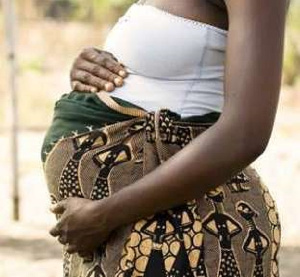The Eastern Region recorded 8,174 teenage pregnancies as of September 2021, up from 7,976 recorded within the same period in 2020, the Ghana Health Service has said.
Of the cases, 12.6 percent represent girls aged 10 to 14 years, while 12.2 percent represent girls between the ages 15 to 19.
The records show an increment of 12.4 percent over the 2020 cases of teenage pregnancies, Dr Winfred Ofosu, the Eastern Regional Director of GHS, said in an interview with the Ghana News Agency.
He said the increment could be associated more with poverty and lack of parental control rather than the Covid-19 pandemic.
“A lot of parents from poor homes may not be able to control their girls very much because if the child needs something and you cannot provide, the child gets it elsewhere,” he said.
According to him, the inability of teenagers to negotiate their way out of sexual demands or advances from men or boys remain a grave challenge.
“If you are a girl and you are cornered, maybe a boy wants to have sex with you, you should be able to talk your way out,” Dr Ofosu said.
He said the increase in teenage pregnancy in 2021 was unexpected because activities were back to normal following the Covid-19 outbreak as schools had been opened, unlike in 2020 when everything was at a standstill.
Dr Ofosu called for a second look at the minimum age of the sexual consent law under the Criminal Offences Act, 1960 (Act 29), which allow teenagers at age 16 to consent to sex, adding; “the way the law is structured really cannot help.”
Research reveals that teenage pregnancies carry extra health risks to both mother and baby, such as the higher risk for pregnancy-related high blood pressure, anaemia, preteen labour, and urinary tract infections.
A GHS survey revealed that 555,575 teenagers, aged 10 to 19, got pregnant between 2016 and 2020, but there was a 1.2 per cent decrease in teenage pregnancy cases in Eastern Region from 2017 to 2021.
The cases as of January to September in 2017, 2018, 2019, 2020, and 2021 were 8,632 (13.4 percent), 8,012 (12.7 percent), 8,196 (13 percent), 7,976 (12.4 percent) and 8,174 (12.6 percent), respectively.
Dr Ofosu said efforts being made to reduce the problem included education, parental control and equipping girls with knowledge on negotiation skills.
“The greatest weapon to reduce teenage pregnancy is to keep girls in school and also increase parental control,” he stated.
Again, girls and boys must be educated extensively on sexuality, devoid of mythical beliefs, he said, adding: “They must be accurately informed about sexuality and not myths.”
Dr Ofosu advised parents to have a family plan and give birth according to their financial strength.
“Most girls who get pregnant come from poor homes, hence if the system is not checked the cycle of poverty will perpetuate.”
Health officials have been campaigning for the use of condoms to provide dual protection from unwanted pregnancy and Sexually Transmitted Infections.
However, Dr Ofosu said: “The good thing is to abstain but where that child is already sexually active and cannot abstain and is likely to get pregnant, and drop out of school, then we advise them to take the methods.”
Meanwhile, Mr Emmanuel Acheampong, the Eastern Regional Public Relations Officer of the Ghana Education Service (GES), said policies such as the “back to school campaign” were being implemented to keep students in school.
The campaign is a programme designed to bring back children of school-going age who, because of the Covid-19 pandemic, have stayed home for a long time and are unwilling to return to school.
He said it ensured that all barriers that prevented a child from returning to school were removed.
During the early stages of the Covid-19 pandemic, the GES implemented programmes such as electronic learning, radio and television programmes to engage students.
Ms Juliana Abbeyquaye, the Eastern Regional Acting Director, Department of Gender, Ministry of Gender, Children and Social Protection, said the Department organised sensitisation programmes on radio and in schools to help educate girls on sex and its consequences.
She associated some causes of teenage pregnancy with gender-based violence, peer pressure, illiteracy and the influx of “Okada” riders.
Latest Stories
-
Bomb blast kills nine at Nigeria bus park in Borno
58 minutes -
M&S boss’s pay hit £7m before cyber attack chaos
1 hour -
Quicker flights promised in flight path shake-up
1 hour -
China says US has ‘severely violated’ tariffs truce
2 hours -
Draper rues ‘missed opportunity’ after Bublik loss
2 hours -
Exercise improves colon cancer survival, major study shows
2 hours -
Macron waxwork stolen from French museum by activists
2 hours -
Bill Gates to give most of his $200bn fortune to Africa
2 hours -
Unpacking the South African land law that so inflames Trump
3 hours -
Victory Bible Church International celebrates 40 years of impact and God’s manifold goodness
3 hours -
Burkinabe national arrested in Assin Fosu for human trafficking
3 hours -
Ghana Football Awards 2025: Abu Kassim, Boatey-Agyei and Mercy Tagoe nominated
3 hours -
Parliament’s Public Accounts Committee saves Ghana over GH¢278m – Bagbin
3 hours -
Factory worker, businessman jailed 3 months each for TV theft
3 hours -
How Ghana’s tax laws help you save with your mortgage
3 hours

